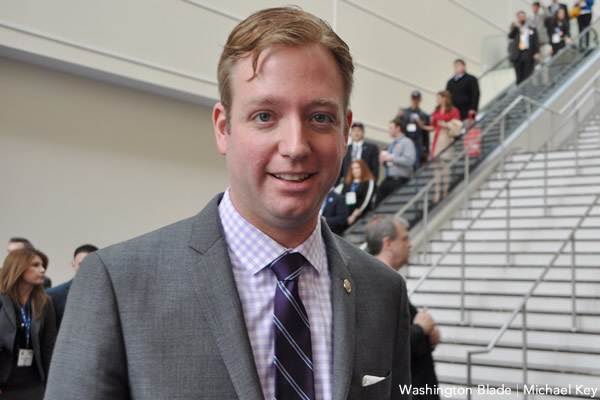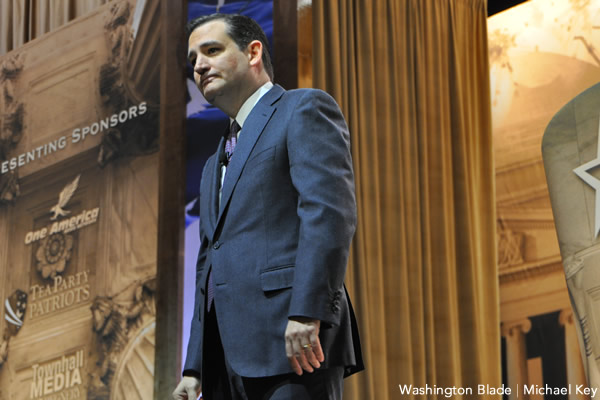News
Republicans ignore LGBT issues at CPAC
Log Cabin criticizes organizers for exclusion from ‘outreach’ panel
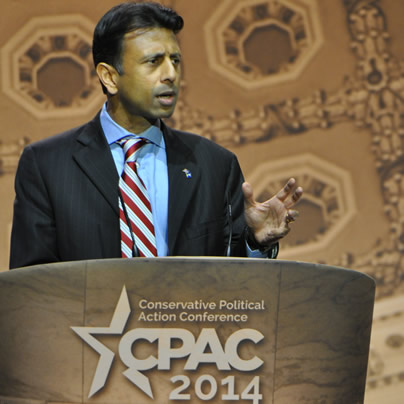
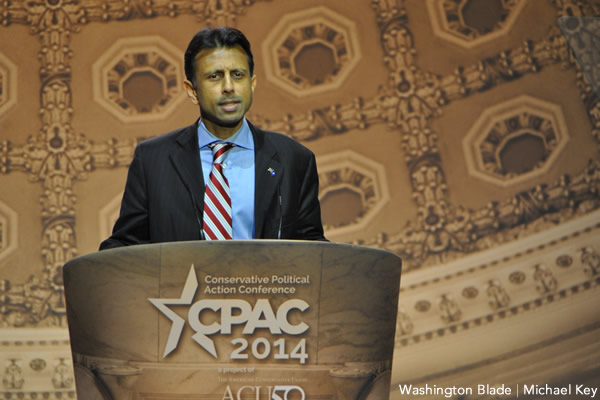
Gov. Bobby Jindal (R-La.) speaking at the 2014 Conservative Political Action Conference. (Washington Blade photo by Michael Key)
NATIONAL HARBOR, Md. — Amid growing support for LGBT rights and following a string of court victories on marriage equality, high-profile Republican speakers avoided those subjects at the first day of the 2014 Conservative Political Action Conference.
Although many of the speakers have previously articulated their opposition to same-sex marriage — with some going as far as supporting a Federal Marriage Amendment — none took the opportunity while speaking before an estimated 8,500 conservatives in attendance to attack gay rights or made statements against the many recent judicial rulings in favor of marriage equality.
Republican Gov. Bobby Jindal (R-La.) most closely approached LGBT issues when he defended his earlier statement supporting Phil Robertson of “Duck Dynasty” for controversial comments equating homosexuality to sinful behavior.
“But the reality is this: I stood up for their right to speak up and articulate their beliefs because I’m tired of the left,” Jindal said. “I’m tired of the left that claims they’re tolerant, claims they’re for diversity — and they are — they are tolerant and they are for diversity except for when you dare to disagree with them.”
Jindal made the reference to “Duck Dynasty” after criticizing the Obama administration for supposedly impinging on the religious liberties of Americans.
Another veiled reference to LGBT issues came up when Sen. Tim Scott (R-S.C.) praised the restaurant chain Chick-fil-A — despite the company’s history of anti-gay donations and controversial comments in opposition to same-sex marriage by owner Dan Cathy.
You would have to look off stage at CPAC to find anti-LGBT sentiments. According to Right Wing Watch, the ultra-conservative Catholic group Tradition, Family, and Property distributed fliers at the event depicting the gay conservative group GOProud as a rainbow-colored beaver, explaining “Why GOProud Does Not Belong at CPAC.”
“Why is GOProud a welcomed and official guest at CPAC, when it advocates the legalization of same-sex ‘marriage,’ thus undermining the votes and dreams of millions of God-fearing Americans?” the flier reportedly says.
Ross Hemminger, co-director of GOProud who helped the group regain its guest status at CPAC after two years of being banned, responded to the flier succinctly.
“I think it’s hilarious,” Hemminger said. “We will proudly be the rainbow beavers.”
Even though no one on stage at CPAC took the opportunity to oppose LGBT rights, no one speaking on stage said anything in favor of them either.
That absence was most acute during a panel titled “Reaching Out: The Rest of the Story,” which looked at the ways the conservative movement can expand into minority groups.
On the panel, moderated by Revolvis Consulting partner Jason Roe, was Republican U.S. Senate candidate from Virginia Ed Gillespie; Robert Woodson, president of the Center for Neighborhood Enterprise and Elroy Sailor, CEO of J.C. Watts Companies.
Although the panel talked at length about the Republican Party entering the black and Latino communities to win over those heavily Democratic constituents, not once did any mention of LGBT outreach come up, nor was the word “gay” even uttered.
Gregory Angelo, executive director of the Log Cabin Republicans, attended CPAC as a guest and criticized the lack of LGBT outreach on the panel in an interview with the Blade.
“The silence is deafening there, as least as far as I’m concerned,” Angelo said. “This is a constituency that the conservative movement needs to reach out to and formally acknowledging that in some capacity is something I think it needs to do.”
In the wake of GOProud’s readmission as a guest to CPAC, Angelo penned an op-ed piece for The Daily Caller saying Log Cabin had sought “meaningful” participation at CPAC, such as a seat on the outreach panel, but was “rebuffed.” The American Conservation Union, which hosts CPAC, didn’t respond to a request for comment.
“Our ask was that we have a voice at the conference — that’s it — whether that was introducing speakers, introducing panelists, or being part of a panel,” Angelo said. “From our perspective, that was a simply non-controversial proposal that would have shown the country that gay conservatives are a meaningful part of this movement, in a vehicle that wasn’t all about ‘gay policy issues.'”
While remaining silent on LGBT issues, a number of prominent Republicans who spoke on stage at CPAC — many of whom are seen as Republican presidential contenders — addressed other relevant issues of the day, often attacking President Obama.
New Jersey Gov. Chris Christie (R) talked about the importance of the “three-legged stool” of the conservative movement — social issues, fiscal issues and national security issues — that Republicans say led to Ronald Reagan’s wide victories during presidential elections in the 1980s.
“When we say that we’re pro-life, and that we’re proudly pro-life, that doesn’t mean that we’re pro-life just when that human being is in the womb,” Christie said. “It means we have to be in favor of an educational system that’s accountable, so that child, as they grow, can have a world-class education. It means that we have to be in favor of a society that creates opportunity and jobs for them — not one that has the government control what they think is good or fair in our society.”
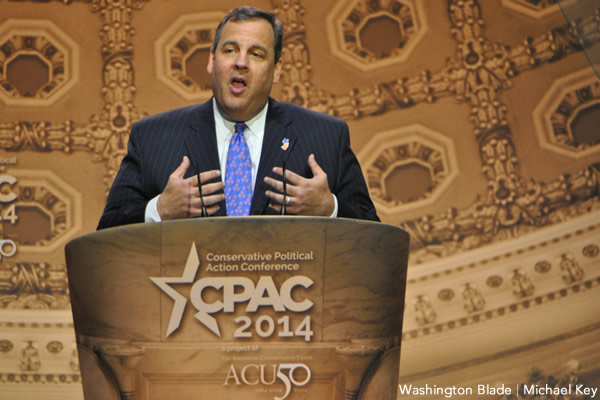
Gov. Chris Christie (R-N.J.) speaking at the 2014 Conservative Political Action Conference. (Washington Blade photo by Michael Key)
Amid concern over Russia’s military incursion into Ukraine, Sen. Marco Rubio (R-Fla.) derided the Obama administration for what he said was allowing the growth of totalitarian regimes in North Korea, Iran, China and Russia.
“All the problems of the world, all the conflicts of the world are being created by totalitarian regimes who are more interested in forcing people to do what they want them to do than truly achieving peace and prosperity and respect for the rights of others,” Rubio said.
Sen. Ted Cruz (R-Texas), another rising Republican star, enumerated several policy items he wanted to achieve, including repeal of Obamacare and Dodd-Frank financial reform, abolition of the IRS and the establishment of the flat-tax.
Following his speech, Cruz took a shot at former Secretary of State Hillary Clinton, whom many see as the likely Democratic presidential nominee in 2016, when asked about her candidacy.
“I’m less concerned about Hillary Clinton than I am about the direction this is country is going,” Cruz said. “We will have had eight years of a failed economic agenda that is resulting in a lack of leadership across the world. It is allowing Russia and China and Iran to expand their spheres of influence and make the world a much more dangerous place, and at home people are hurting. We’ve got the lowest labor force participation since 1978. Let me tell you, we can’t afford eight more years of this: Hillary Clinton would continue the failed Obama economic agenda.”
It should be noted Cruz is an opponent of marriage equality and has introduced in the Senate the State Defense Marriage Act, which would prohibit the federal government from recognizing same-sex unions in states where they’re illegal.
District of Columbia
Capital Pride board member resigns, alleges failure to address ‘sexual misconduct’
In startling letter, Taylor Chandler says board’s inaction protected ‘sexual predator’

Taylor Lianne Chandler, a member of the Capital Pride Alliance Board of Directors since 2019 who most recently served as the board’s secretary, submitted a letter of resignation on Feb. 24 that alleges the board has failed to address instances of “sexual misconduct” within the Capital Pride organization.
The Washington Blade received a copy of Chandler’s resignation letter one day after she submitted it from an anonymous source. Chandler, who identifies as transgender and intersex, said in an interview that she did not send the letter to the Blade, but she suspected someone associated with Capital Pride, which organizes D.C.’s annual LGBTQ Pride events, “wants it out in the open.”
“It is with a heavy heart, but with absolute clarity, that I submit my resignation from the Capital Pride Alliance Board of Directors effective immediately,” Chandler states in her letter. “I have devoted nearly ten years of my life to this organization,” she wrote, pointing to her initial involvement as a volunteer and later as a producer of events as chair of the organization’s Transgender, Gender Non-Conforming, and Intersex Committee.
“Capital Pride once meant something profound to me – a space of safety, visibility, and community for people who have often been denied all three,” her letter continues. “That is no longer the organization I am part of today.”
“I, along with other board members, brought forward credible concerns regarding sexual misconduct – a pattern of behavior spanning years – to the attention of this board,” Chandler states in the letter. “What followed was not accountability. What followed was retaliation. Rather than addressing the substance of what was reported, officers and fellow board members chose to chastise those of us who came forward.”
The letter adds, “This board has made its priorities clear through its actions: protecting a sexual predator matters more than protecting the people who had the courage to come forward. … I have been targeted, bullied, and made to feel like an outsider for doing what any person of integrity would do – telling the truth.”
In response to a request from the Blade for comment, Anna Jinkerson, who serves as chair of the Capital Pride board, sent the Blade a statement praising Taylor Chandler’s efforts as a Capital Pride volunteer and board member but did not specifically address the issue of alleged sexual misconduct.
“We’re also aware that her resignation letter has been shared with the media and has listed concerns,” Jinkerson said in her statement. “When concerns are brought to CPA, we act quickly and appropriately to address them,” she said.
“As we continue to grow our organization, we’re proactively strengthening the policies and procedures that shape our systems, our infrastructure, and the support we provide to our team and partners,” Jinkerson said in her statement. “We’re doing this because the community’s experience with CPA must always be safe, affirming, empowering, and inclusive,” she added.
In an interview with the Blade, Chandler said she was not the target of the alleged sexual harassment.
She said a Capital Pride investigation identified one individual implicated in a “pattern” of sexual harassment related behavior over a period of time. But she said she was bound by a Non-Disclosure Agreement (NDA) that applies to all board members and she cannot disclose the name of the person implicated in alleged sexual misconduct or those who came forward to complain about it.
“It was one individual, but there was a pattern and a history,” Chandler said, noting that was the extent of what she can disclose.
“And I’ll say this,” she added. “In my opinion, with gay culture sometimes the touchy feely-ness that goes on seems to be like just part of the culture, not necessarily the same as a sexual assault or whatever. But at the same time, if someone does not want those advances and they’re saying no and trying to push you away and trying to avoid you, then it makes it that way regardless of the culture.”
When asked about when the allegations of sexual harassment first surfaced, Chandler said, “In the past year is when the allegation came forward from one individual. But in the course of this all happening, other individuals came forward and talked about instances – several which showed a pattern.”
Chandler’s resignation comes about five months after Capital Pride Alliance announced in a statement released in October 2025 that its then board president, Ashley Smith, resigned from his position on Oct. 18 after Capital Pride became aware of a “claim” regarding Smith. The statement said the group retained an independent firm to investigate the matter, but it released no further details since that time. Smith has declined to comment on the matter.
When asked by the Blade if the Smith resignation could be linked in some way to allegations of sexual misconduct, Chandler said, “I can’t make a comment one way or the other on that.”
Chandler’s resignation and allegations come after Capital Pride Alliance has been credited with playing the lead role in organizing the World Pride celebration hosted by D.C. in which dozens of LGBTQ-related Pride events were held from May through June of 2025.
The letter of resignation also came just days before Capital Pride Alliance’s annual “Reveal” event scheduled for Feb. 26 at the Hamilton Hotel in which the theme for D.C.’s June 2026 LGBTQ Pride events was to be announced along with other Pride plans.
District of Columbia
Capital Stonewall Democrats elect new leaders
LGBTQ political group set to celebrate 50th anniversary

Longtime Democratic Party activists Stevie McCarty and Brad Howard won election last week as president and vice president for administration for the Capital Stonewall Democrats, D.C.’s largest local LGBTQ political organization.
In a Feb. 24 announcement, the group said McCarty and Howard, both of whom are elected DC Advisory Neighborhood Commissioners, ran in a special Capital Stonewall Democrats election to fill the two leadership positions that became vacant when the officers they replaced resigned.
Outgoing President Howard Garrett, who McCarty has replaced, told the Washington Blade he resigned after taking on a new position as chair of the city’s Ward 1 Democratic Committee. The Capital Stonewall Democrats announcement didn’t say who Howard replaced as vice president for administration.
The group’s website shows its other officers include Elizabeth Mitchell as Vice President for Legislative and Political Affairs, and Monica Nemeth as Treasurer. The officer position of secretary is vacant, the website shows.
“As we look toward 2026, the stakes for D.C. and for LGBTQ+ communities have never been clearer,” the group’s statement announcing McCarty and Howard’s election says. “Our 50th anniversary celebration on March 20 and the launch of our D.C. LGBTQ+ Voter’s Guide mark the beginning of a major year for endorsements, organizing, and coalition building,” the statement says.
McCarty said among the organization’s major endeavors will be holding virtual endorsement forums where candidates running for D.C. mayor and the Council will appear and seek the group’s endorsement.
Founded in 1976 as the Gertrude Stein Democratic Club, the organization’s members voted in 2021 to change its name to Capital Stonewall Democrats. McCarty said the 50th anniversary celebration on March 20, in which D.C. Mayor Muriel Bowser and members of the D.C. Council are expected to attend, will be held at the PEPCO Gallery meeting center at 702 8th St., N.W.
Federal Government
Two very different views of the State of the Union
As Trump delivered his SOTU address inside the Capitol, Democratic lawmakers gathered outside in protest, condemning the administration’s harmful policies.

As President Donald Trump delivered his State of the Union address inside the U.S. Capitol — touting his achievements and targeting political enemies — progressive members of Congress gathered just outside in protest.
Their message was blunt: For many Americans, particularly LGBTQ people, the country is not better off.
Each year, as required by Article II, Section 3 of the Constitution, the president must “give to the Congress Information of the State of the Union.” The annual address is meant to outline accomplishments and preview the year ahead. This year, Trump delivered the longest State of the Union in U.S. history, clocking in at one hour and 48 minutes. He spoke about immigration, his “law and order” domestic agenda, his “peace through strength” foreign policy doctrine, and what he framed as the left’s ‘culture wars’ — especially those involving transgender youth and Christian values.
But one year into what he has called the “Trump 2.0” era, the picture painted outside the Capitol stood in stark contrast to the one described inside.
Transgender youth
In one of the most pointed moments of his speech, Trump spotlighted Sage Blair, using her story to portray gender-affirming care as coercive and dangerous. Framing the issue as one of parental rights and government overreach, he told lawmakers and viewers:
“In the gallery tonight are Sage Blair and her mother, Michelle. In 2021, Sage was 14 when school officials in Virginia sought to socially transition her to a new gender, treating her as a boy and hiding it from her parents. Hard to believe, isn’t it? Before long, a confused Sage ran away from home.
“After she was found in a horrific situation in Maryland, a left-wing judge refused to return Sage to her parents because they did not immediately state that their daughter was their son. Sage was thrown into an all-boys state home and suffered terribly for a long time. But today, all of that is behind them because Sage is a proud and wonderful young woman with a full ride scholarship to Liberty University.
“Sage and Michelle, please stand up. And thank you for your great bravery and who can believe that we’re even speaking about things like this. Fifteen years ago, if somebody was up here and said that, they’d say, what’s wrong with him? But now we have to say it because it’s going on all over, numerous states, without even telling the parents.
“But surely, we can all agree no state can be allowed to rip children from their parents’ arms and transition them to a new gender against the parents’ will. Who would believe that we’ve been talking about that? We must ban it and we must ban it immediately. Look, nobody stands up. These people are crazy. I’m telling you, they’re crazy.”
The story, presented as encapsulation of a national crisis, became the foundation for Trump’s renewed call to ban gender-affirming care. LGBTQ advocates — and those familiar with Blair’s story — argue that the situation was far more complex than described and that using a single anecdote to justify sweeping federal restrictions places transgender people, particularly youth, at greater risk.
Equality Virginia said the president’s remarks were part of a broader effort to strip transgender Americans of access to care. In a statement to the Blade, the group said:
“Tonight, the president is choosing to double down on efforts to disrupt access to evidence-based, lifesaving care.
“Rather than allowing families and doctors to navigate deeply personal medical decisions free from federal interference — or allowing schools to respond with nuance and compassion without putting marginalized children at risk — the president is instead advocating for reckless, one-size-fits-all political control.
“At a time when Virginians are worried about rising costs, economic uncertainty, and aggressive immigration enforcement actions disrupting communities and families, attacking transgender young people is a blatant political distraction from the real challenges facing our nation. Virginia families and health care providers do not need Donald Trump telling them what care they do or do not need.”
For many in the LGBTQ community, the rhetoric inside the chamber echoed actions already taken by the administration.
Earlier this month, the Pride flag was removed from the Stonewall National Monument under a National Park Service directive that came from the top. Community members returned to the site, raised the flag again, and filed suit, arguing the removal violated federal law. To advocates, the move was symbolic — a signal that even the legacy of LGBTQ resistance was not immune.
Immigration and fear
Immigration dominated both events as well.
Inside the chamber, Trump boasted about the hundreds of thousands of immigrants detained in makeshift facilities. Outside, Democratic lawmakers described those same facilities as concentration camps and detailed what they characterized as the human toll of the administration’s enforcement policies.
Sen. Ed Markey (D-Mass.), speaking to the crowd, painted a grim picture of communities living in fear:
“People are vanishing into thin air. Quiet mornings are punctuated by jarring violence. Students are assaulted by ICE agents sitting outside the high school, hard working residents are torn from their vehicles in front of their children. Families, hopelessly search for signs of their loved ones who have stopped answering their phones, stop replying to text… This is un-American, it is illegal, it is unconstitutional, and the people are going to rise up and fight for Gladys Vega and all of those poor people who today need to know that the people’s State of the Union is the beginning of a long fight that is going to result in the end of Republican control of the House of Representatives and the Senate in the United States of America in 2026.”
Speakers emphasized that LGBTQ immigrants are often especially vulnerable — fleeing persecution abroad only to face detention and uncertainty in the United States. For them, the immigration crackdown and the attacks on transgender health care are not separate battles but intertwined fronts in a broader cultural and political war.
Queer leadership

After delivering remarks alongside Robert Garcia, Kelley Robinson, president of the Human Rights Campaign, took the stage and transformed the freezing crowd’s anger into resolve.
Garcia later told the Blade that visibility matters in moments like this — especially when LGBTQ rights are under direct attack.
“We should be crystal clear about right now what is happening in our country,” Garcia said. “We have a president who is leading the single largest government cover up in modern history, we have the single largest sex trafficking ring in modern history right now being covered up by Donald Trump and Pam Bondi In the Department of Justice. Why are we protecting powerful, wealthy men who have abused and raped women and children in this country? Why is our government protecting these men at this very moment? In my place at the Capitol is a woman named Annie farmer. Annie and her sister Maria, both endured horrific abuse by Jeffrey Epstein and Ghislaine Maxwell. As we move forward in this investigation, always center the survivors; we are going to get justice for the survivors. And Donald Trump may call this investigation a hoax. He may try to deflect our work, but our message to him is very clear that our investigation is just getting started, and we will we will get justice for these survivors.”
He told the Blade afterwards that having queer leaders front and center is itself an act of resistance.
“I obviously was very honored to speak with Kelley,” the California representative said. Kelley is doing a great job…it’s important that there are queer voices, trans voices, gay voices, in protest, and I think she’s a great example of that. It’s important to remind the country that the rights of our community continue to be attacked, and then we’ve got to stand up. Got to stand up for this as well.”
Robinson echoed that call, urging LGBTQ Americans — especially young people — not to lose hope despite the administration’s escalating rhetoric.
“There are hundreds of thousands of people that are standing up for you every single day that will not relent and will not give an inch until every member of our community is protected, especially our kids, especially our trans and queer kids. I just hope that the power of millions of voices drowns out that one loud one, because that’s really what I want folks to see at HRC. We’ve got 3.6 million members that are mobilizing to support our community every single day, 75 million equality voters, people that decide who they’re going to vote for based on issues related to our community. Our job is to make sure that all those people stand up so that those kids can see us and hear our voices, because we’re going to be what stands in the way.”
A boycott — and a warning
The list of Democratic lawmakers who boycotted the State of the Union included Sens. Ruben Gallego, Ed Markey, Jeff Merkley, Chris Murphy, Adam Schiff, Tina Smith, and Chris Van Hollen, along with dozens of House members.
For those gathered outside — and for viewers watching the livestream hosted by MoveOn — the counter-programming was not merely symbolic. It was a warning.
While the president spoke of strength and success inside the chamber, LGBTQ Americans — particularly transgender youth — were once again cast as political targets. And outside the Capitol, lawmakers and advocates made clear that the fight over their rights is far from over.


